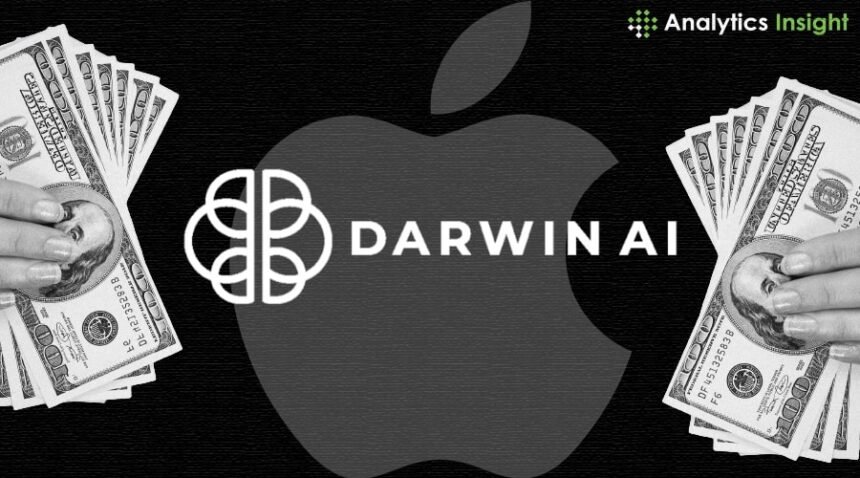DarwinAI acquisition bolsters on-device AI, enhancing Apple’s technological prowess
In the relentless pursuit of technological innovation, Apple has always been at the forefront. From groundbreaking hardware to revolutionary software, Apple’s commitment to excellence is unparalleled. Now, with its recent acquisition of DarwinAI, the tech giant is poised to push the boundaries of on-device artificial intelligence (AI) even further. This strategic move not only underscores Apple’s dedication to advancing AI capabilities but also heralds a new era of seamless integration between AI algorithms and consumer devices.
DarwinAI: Pioneering AI Solutions:
Before delving into the implications of Apple’s acquisition, it’s essential to understand DarwinAI’s significance in the AI landscape. Founded in 2017, DarwinAI is a cutting-edge AI solutions provider known for its expertise in optimizing deep neural networks. Their proprietary technology, Generative Synthesis, enables AI models to be compressed and accelerated without sacrificing performance. This breakthrough approach has widespread applications across various industries, from healthcare to automotive, making DarwinAI a coveted asset in the AI community.
Apple’s Strategic Vision:
Apple’s acquisition of DarwinAI isn’t merely a business transaction; it’s a strategic maneuver aimed at fortifying its position in the AI arena. With the proliferation of AI-driven functionalities in consumer devices, such as facial recognition, voice assistants, and augmented reality, Apple recognizes the importance of bolstering on-device AI capabilities. By integrating DarwinAI’s technology into its ecosystem, Apple can enhance the efficiency, privacy, and performance of AI algorithms running on its devices, thereby delivering a superior user experience.
Empowering On-Device AI:
One of the most significant implications of Apple’s acquisition of DarwinAI is the empowerment of on-device AI. Traditionally, AI processing has relied heavily on cloud-based infrastructure, posing concerns regarding data privacy, latency, and dependency on internet connectivity. However, by leveraging DarwinAI’s expertise in model optimization, Apple can deploy complex AI algorithms directly onto its devices, minimizing reliance on external servers. This shift towards on-device AI not only enhances user privacy but also enables faster, more responsive AI-driven functionalities, even in offline scenarios.
Enhanced Performance and Efficiency:
DarwinAI’s Generative Synthesis technology holds the key to unlocking unprecedented levels of performance and efficiency in AI algorithms. By applying advanced optimization techniques, such as network pruning and quantization, DarwinAI can significantly reduce the computational and memory requirements of deep learning models while preserving their accuracy. This optimization translates into faster inference speeds, lower energy consumption, and reduced hardware resource usage, enabling Apple to deliver AI-powered features that are both powerful and resource-efficient.
Privacy and Security:
Privacy has become a paramount concern in the digital age, particularly with the widespread adoption of AI technologies. By embracing on-device AI powered by DarwinAI’s technology, Apple reinforces its commitment to user privacy and data security. With AI processing occurring locally on the device, sensitive information such as biometric data and personal preferences remains safeguarded from potential security breaches or unauthorized access. This decentralized approach to AI not only enhances user trust but also aligns with Apple’s ethos of prioritizing customer privacy.
Seamless Integration Across Ecosystems:
Another advantage of Apple’s acquisition of DarwinAI is the seamless integration of AI capabilities across its ecosystem of devices and services. Whether it’s the iPhone, iPad, Mac, or Apple Watch, each device stands to benefit from optimized on-device AI, delivering a consistent and cohesive user experience. Furthermore, by leveraging DarwinAI’s technology in conjunction with its software platforms like iOS and macOS, Apple can streamline the development and deployment of AI-driven features, fostering innovation and differentiation in its product lineup.
Source: www.analyticsinsight.net


